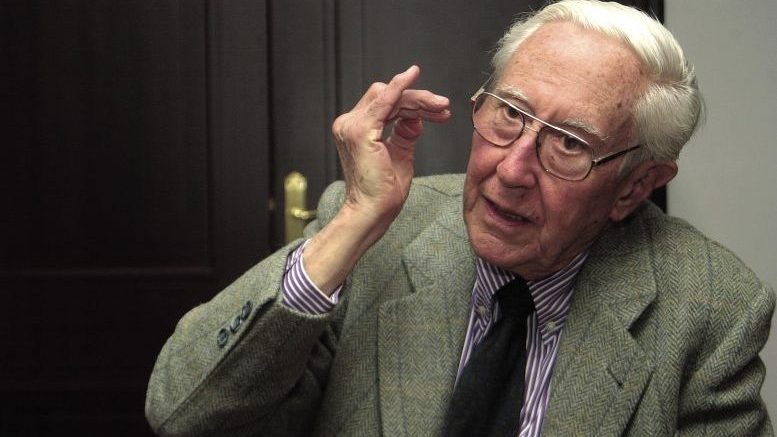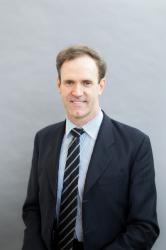January 7, 2022, marks the fifth anniversary of the death of a man who played a major role in spreading throughout Latin America the key ideas that underpin the free society. Intellectual, lawyer, journalist, economist, university professor, and public servant, Ramón P. Díaz (1926–2017) has good claim to being one of the 20th century’s most important Latin American classical liberal thinkers. I was fortunate enough to count him as a friend.
A citizen of Uruguay, Díaz was a leading exponent of constitutionalism, limited government, and market economies on a continent in which such ideas have long struggled to gain traction. For years he taught political economy at what was then Uruguay’s only university. Díaz also wrote several books, including in later life a 527-page Historia económica del Uruguay (2003) that’s widely considered a definitive text.
But Díaz wasn’t just a thinker and teacher. He was also a man of action. In 1972 he established a journal, Búsqueda, to spread ideas about market economics and the free society. Díaz also wrote prolifically for major newspapers like El Observador in which he covered topics ranging from history to contemporary economics. Amid all this, Díaz found time to serve in high office. He was sub-secretary of the Ministry of Industry and Commerce from 1968 to 1969 before becoming director of the Office of Budget and Planning in 1970. In 1990, Díaz was appointed president of the Central Bank of Uruguay. He found himself confronting an inflation crisis but also charged with renegotiating Uruguay’s massive foreign debt with Western governments and banks.
I first met Díaz at a Mont Pelerin Society meeting in Indonesia. I was not even 30 and was frankly intimidated about being asked to present at the international society for free market thinkers founded by F.A. Hayek. At the time, Díaz was the society’s president. I noticed him sitting in the audience, motionless, but listening intently to the presentations. After the session, he walked up and introduced himself with what I would learn was his habitual Old World courtesy. During our discussion, Díaz suddenly asked, “Are you by any chance Catholic?” I suppose he asked because I had made a positive reference to natural law philosophy. “Yes,” I responded, “albeit deeply imperfect.” “Bueno,” Díaz said, “let’s talk.”
Therein began a conversation that lasted for years. At seminars and conferences that we found ourselves attending, we would often talk late into the middle of the night about topics like some obscure text penned by Aquinas or an even more obscure academic article about monetary policy that he and I apparently were the only people in the world to have read.
Díaz was largely responsible for getting me interested in monetary policy, not least because he knew the theory but also the practice. When Díaz was made Uruguay’s Central Bank president in 1990, inflation in Uruguay was over 112%. At the end of Díaz’s term in 1993, it had fallen to 44%, and hit single digits in 1998, which is now considered normal in his country.
The cost, however, of smashing high inflation was great. The side effects of raising interest rates to purge the poison from the system are considerable, whether it’s growing unemployment or businesses struggling to repay their loans. Díaz, however, knew that there were no shortcuts, and he wasn’t prepared to preside serenely over a do-nothing institution. His tough-mindedness didn’t make him popular with most Uruguayan politicians, who had long supported easy money policies and high deficit spending. Popularity, however, never interested Díaz. It was intellectual and moral integrity that drove him.
The cost of being faithful to his principles proved significant during the military dictatorship that ruled Uruguay between 1973 and 1985. Díaz only talked to me about it once, but the regime imprisoned him twice. His sins included publicly criticizing the government’s press censorship and its infringements on the judiciary’s independence. His magazine also asked questions about what was happening to the leftist activists and Cuban-inspired urban guerrillas whom the regime “disappeared.” Those who jailed Díaz were hard men. On the second occasion, Díaz’s family were not sure where he was for several days and feared the worst.
Díaz had no illusions about the Latin American left. He knew all about its infatuation with violence and Marxism’s deep influence on its view of the world. He often referenced how left-wing intellectuals endlessly stoked the deep resentment that lies just beneath the surface of so much of Latin America after decades of largely self-inflicted political and economic disasters. Nevertheless, Díaz believed that everyone should enjoy basic freedoms and protection from arbitrary power. That included those on the radical left—some of whom, I suspect, might have been inclined to “disappear” him if they ever seized power.
People derive the strength of their convictions from many sources. Two stood out in Díaz’s case. First was his belief in the civilization of the West. He was deeply read in the classics, and even learned Greek and Latin in order to read them in the original. Among his great loves were the writings of Edmund Burke and Adam Smith. That’s why he preferred to call himself an “Old Whig” when asked to define himself politically. For Díaz, some of the best of Western civilization was to be found in these and other texts, which needed expounding and defending.
Second, Díaz was a devout Catholic. He rarely talked publicly about his faith, but it was central to his life. It was also an occasional source of awkwardness. Uruguay has long been one of Latin America’s most secular nations, and its political culture, shaped by late 19th-century French freemasonry, has always had an anti-Catholic edge to it. On a visit to Montevideo sometime in the early 2000s, the subject of population control came up at a meeting of economists at which Díaz had invited me to talk. As we sat listening to one professor’s seemingly interminable anti-Catholic rant, Díaz leaned toward me and whispered, “It’s always the Third Republic here.” He was alluding to how the French Third Republic had made a concerted effort to marginalize the influence of practicing Catholics in public life.
There were, however, other challenges. Díaz’s free market views put him at odds with the economic nationalism and corporatism that prevails in many conservative Catholic circles in Latin America. He also found himself confronting the liberation theologians whose fascination with Marx led them to embrace a Manichaean view of the world and to propose policies that, if implemented, would have been downright destructive of economic order. Unlike most of them, Díaz had actually waded his way through the turgid prose that is Das Kapital to ensure he was as familiar as possible with Marxist economics. All this contributed to tensions with many Catholic clerics and laity, which I don’t imagine was especially easy for Díaz to bear.
On several occasions, I heard Díaz referenced as “the pope of neoliberalism”—presumably because of his role in promoting the free society throughout Latin America. I always thought that the “pope” label was misleading. Díaz didn’t claim some type of special authority and had no interest in policing the various, often fractious groups of classical liberals throughout the continent.
Díaz was far more the lonely but single-minded knight. He was a free man who was beholden to no one and nothing except the truth, and gave selflessly of himself to others. Díaz once told me that there might be times when you would be asked to do more than is humanly reasonable. If those times came, he added in a matter-of-fact way, you had to embrace them, because it was your duty to your fellow man. It was an aristocratic ethos, but one that characterized those conservative liberals like Alexis de Tocqueville and Wilhelm Röpke whom Díaz especially admired.
From the standpoint of ordered liberty, much of Latin America is a dumpster fire these days. For the most part, leftists, populists, and cronies reign supreme, from Mexico to Argentina. The rule of law, never strong at the best of times, is (once again) approaching rock bottom in many Latin American countries. Central bank governors flay about, knowing full well what they should be doing but unwilling or afraid to do it. Chile has just elected as its president a 35-year-old student leader, Gabriel Boric, who is fond of quoting Salvador Allende—notable for, among other things, having successfully destroyed his nation’s economy in less than three years and plunging it into a constitutional crisis.
Salvation, however, will not come from the outside. Free societies ultimately need to be sustained from within by sound institutions and, above all, men and women of conviction. Latin America desperately needs far more people like Ramón P. Díaz. I have no doubt that his legacy and example continue to inspire many Latin Americans who simply want to live in societies in which free men and women can flourish as they ought.

